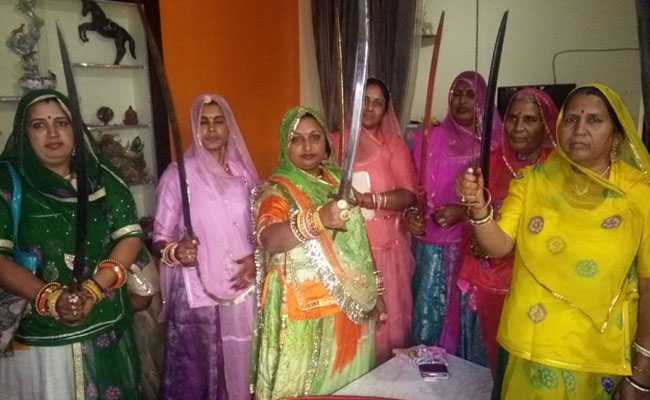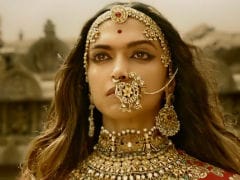The Jauhar Kshatrani Manch was formed about two years ago to oppose the release of Sanjay Leela Bhansali's film on the legendary Rani Padmini, believed to be the wife of Raja Ratan Singh, ruler of Mewar in the 13-14th century. "Bhansali changed the name of the film from Padmavati to Padmaavat, we've done the same. The Jauhar Kshatriya Manch wanted "Padmavati" to be banned and now insist "Padmaavat" be banned," declares Manjushree before turning to direct the women on how they should hold the swords for the camera.
We're meeting at Manjushree's spacious double-storey bungalow in Chittor city. Her husband and son work for Hindustan Zinc. She tells me that for her, a housewife, the sight of Deepika Padkone dancing without a ghunghat (veil) was a turning point in her life. "That very moment I resolved I would not let Bhansali violate a Rajput woman's pride. Now I am the busiest person in the entire family." Asked if her group supports the Karni Sena, Nirmala Rathore, General Secretary of the Manch, answers, "Of course we support them and they support us. We are one."
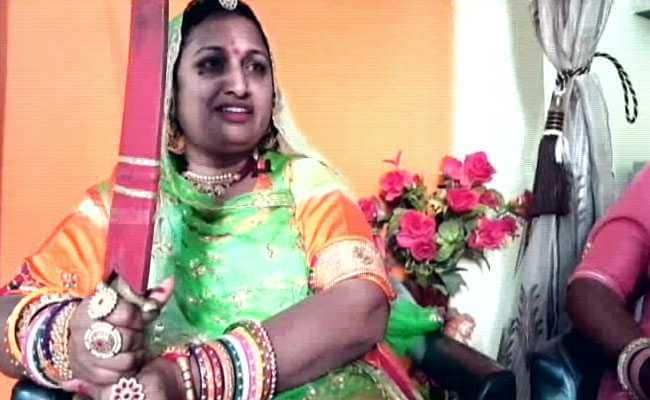
Nirmala Rathore, general secretary of Jauhar Kshatrani Manch
The women have lately taken to dressing in full bridal finery. "These are not clothes we wear every day, only on festivals or for our weddings. Women who went to commit sati or jauhar would also dress like this. So we dress like this to ensure that we're ready when the time comes to sacrifice ourselves in honour of our Queen," Nirmala explains, keen to detail the jewellery the women are wearing - lehengas, odhnis, rakhri on the head, the bajuband on their arm, hathphools on their fingers - ornaments that cover them head to toe.
"A Rajput woman will prefer to feel the flames on her body than lose her honour. It is not easy to do so. We flinch just at the touch of something hot. I can't keep my tears away when I think of our Rani going bravely to her death, she is our mother, we are her children," says an elderly Rathore woman, unable to complete her sentence as she begins to cry, as do some of the others.
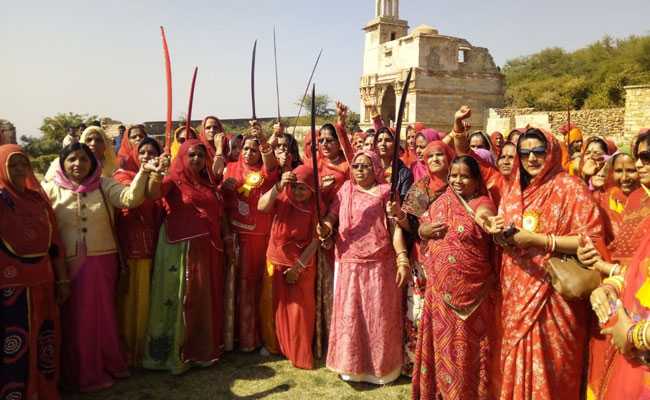
The 'Swabhimaan Rally' last week at Chittor Fort
Manjushree pitches into Malik Mohammad Jayasi's epic 16th-century poem "Padmaavat", the source for much of what we associate with the Queen. "Jayasi was a Mohammaden so of course he will want to distort the story of a Rajput queen and cast her in a love story with the Muslim ruler Khilji. Why did Bhansali follow suit?" Jayasi does no such thing. What he does do is immortalize her in such a way that most of what is known and recounted about the queen can be traced back to his "Padmaavat".
Such thinly-disguised communalism goes hand-in-hand with a deep conservatism. The true focus of their anger is the film's grand song sequence featuring Deepika Padkone as Rani Padmavati, dancing the ghoomar. The ghoomar is a wedding dance moored in Rajput tradition but for long now part of a shared culture with other Rajasthani communities. "When Deepika Padkone does the ghoomar, her lehenga rises so high you can see her legs," complains Nirmala. Manjushree shows me a clip on her phone - a video of her dancing at a recent family wedding. "This is how Rajput women dance, in full ghunghat and only in the presence of women."
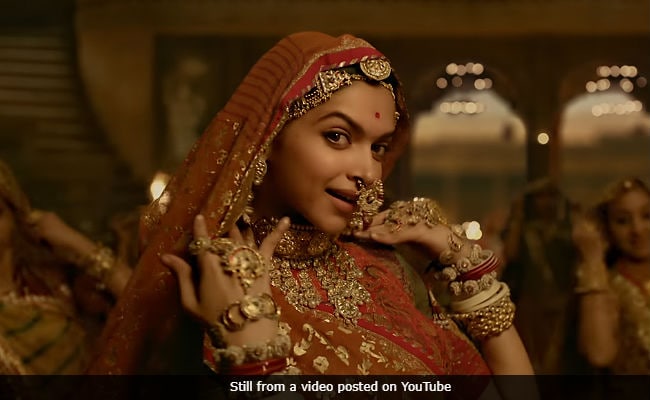
Deepika Padukone in the song Ghoomar from "Padmaavat" (Image credit: YouTube)
The ironies of history would, in any case, be no match for the anger of these women. A younger woman, her voice trembling, shouts across room, "When I see the film, my blood boils. If we can't save the honour of Ma Padmavati how do we save ours? Let me warn you, don't think our protests will die down. They will escalate. Our men will fight and we will burn if need be. Bring Deepika Padukone to me and I will cut her nose off. A Hindu Kshatriya Rajput woman knows how to wield her shastras (arms)."
As a journalist, I'm forced to wonder if giving voice to these women on air or in print is counter-productive, actually fuelling the irrationality of the protests. But the sad truth is that while the women of the Johar Kshatrani Manch may be the extreme faces of the protests, their views find widespread acceptance in this region.
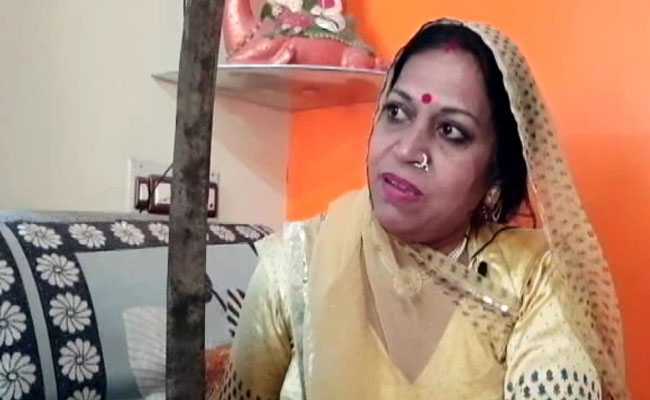
Manjushree Shaktavat, president of Jauhar Kshatrani Manch
One of the boys in the group, Mohal Lal Meghwal says not just Rajputs, "sarv samaj, sarv dharma" - all the communities in Chittor - support the ban. "Why when the Supreme Court hasn't given a decision on the Ram Mandir for years, should they give a decision on 'Padmaavat' in just a few days?" In the face of ordinary Mewari youth studying in school and college (Pooja Rathore is only in 10th grade), my attempts to find voices of reason seem futile.
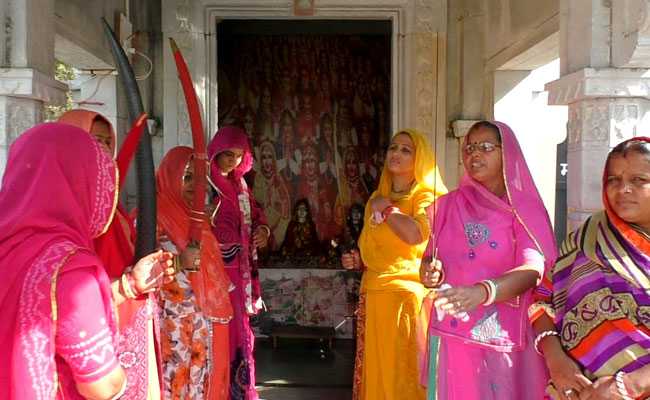
Kshatrani Manch at the widely visited Jauhar Mandir in Chittor
"That's rubbish." The women of the Kshatrani Manch insist the distributors are not scared. "They are not releasing the film as they understand the honour of Rajasthan is under threat."
Any other questions about their movement are dismissed by a series of rapid fire, practiced responses. "When people from your Jain community demanded the right to santhara (fasting to death", they tell me, "we supported them. We told them we now expect their help."
"The state has taken our land, our arms, banned our sacred practice of sati, but we will not let the film succeed".
Comments
"We went up to the fort to sacrifice ourselves twice, but were not allowed. Let me warn you - there will be an apocalypse if the film runs its course. We will not let Ma Padmavati's sacrifice go in vain."I tell them that in Udaipur, where I come from, few say 'Padmavati', but refer to the legendary queen of Chittor as 'Rani Padmini'. They answer, "You're right, we also say 'Rani Padmini', but after Bhansali's film we've all started saying 'Ma Padmavati'."
